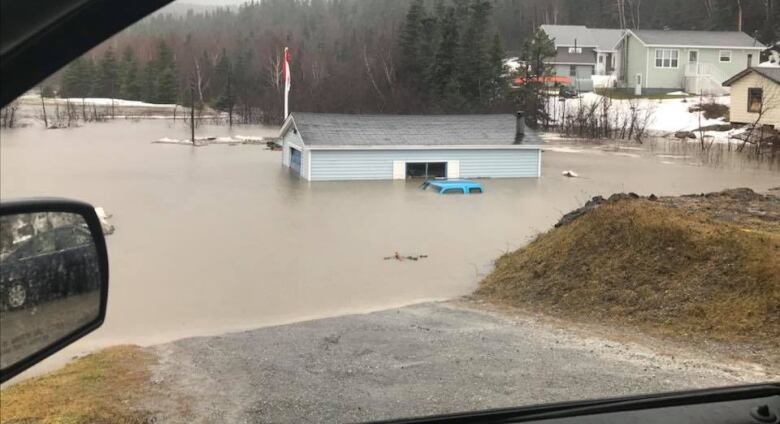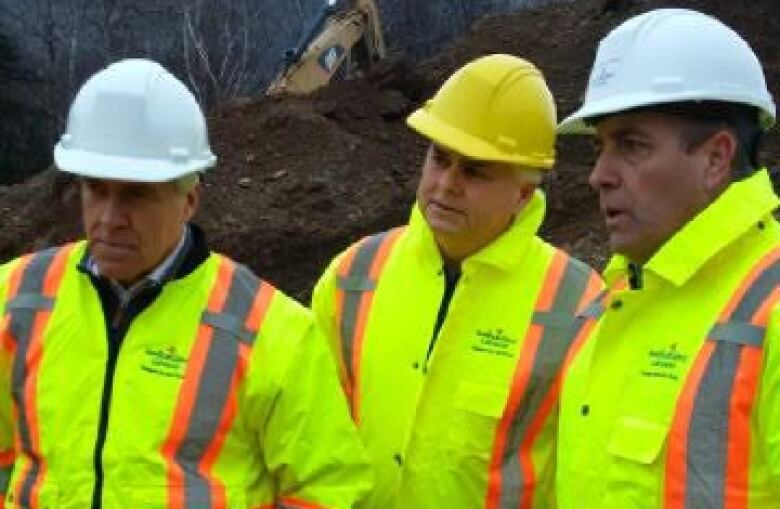After last week's storm, we need to talk about climate change
Premier Dwight Ball is not the only one expecting more extreme weather events

Climate change is often perceived as an abstract concept, seen from afar something forgenerations down the road.
Last weekend's heavy rainfall and flooding events in western Newfoundland are sober reminders that climate change is closer than we think.
Unusually warm temperatures, heavy precipitation, snow melt, water overflow, flooding and mudslides combined to causesevere damage to people's homes, infrastructure androads.
Several west coast communities declared states of emergency, with people cut off from the rest of the province due to washed-out highway.
The climate change connection
The implications were apparent to Newfoundland and Labrador's premier.
"Climate change is real," Dwight Ball told CBCRadio earlier this week, "and I agree that we need to do the best we can when we replace infrastructure to make sure we have the appropriate infrastructure in place to handle weather events like this".

Though there are varying factors at play in the relationship between short term weather events like the floods with regards to climate change, a warming climate can change the frequency, intensity of extreme weather events making them stronger and more frequent.
Although much of the Newfoundland and Labrador coastline is a high rocky rugged area, rising sea levels, coastal erosion, and increased storms pose adaptation challenges and costs as a result of climate change (see Turn Back the Tide).
According the province's 50-year climate projections, temperatures are expected to get warmer, and the province will see an increase in precipitation and extreme weather events over the next 20 to 50 years.
Increased storms can cause flooding, wind damage and coastal erosion, ultimately having negative impacts in coastal communities, infrastructure and ecosystems.
For instance, Hurricane Igor caused$51 million in damages, isolated approximately 90 communities due to road closures, and put 22 communities in astate of emergency.

Although there is not an estimate of the damages of last weekend's events in the west coast, it is expected that heavy rainfall and rapid snow melt from warm temperatures have done millions of dollars in damage to structure and roads.
A 2015 assessment by Natural Resources Canada estimates that, by 2020, the annual economic damages to Canada's coasts from sea level rise and storm surges could reach between $2.6-$5.4 billion, increasing to an estimated $48.1 billion by 2080.
The global picture
Limiting the rise in global temperatures is key to mitigate and help minimize the damage caused by extreme weather events.
Two years ago, world leaders signed the Paris Agreement and pledged to limit global temperature increase below 2 degreesabove pre-industrial levels, and to drive efforts to limit the temperature increase to 1.5 degreesa safer defence line against climate change impacts.
Since 1880, Earth'sglobal temperature has risen by 1 degree as a result of increased carbon dioxide and other human-made emissions into the atmosphere.
According to aNASAreport, most of this warming has happened in the past 35 years with 2017 being the second warmest year on record.
Unless we cut greenhouse gas emissions significantly, the effects of climate change will continue to grow and scale as temperature increases in Canada and in the rest of the world.
The closer we stay within the 1.5 degreesgoal, the less challenging it will be for communities to adapt and to mitigate climate change impacts.
Global challenge,local solutions
Climate change requires cooperation between countries but it also requires engagement from subnational levels cities, provinces (or states) and regions to reinforce climate commitments.

Last November at the UN Climate Negotiations in Bonn, Germany, governments convened to develop the tools for implementing the Paris Agreement. I attended as a youth delegate.
A theme at the negotiations was the need to integrate subnational levels in the climate movement.
"There is no single solution to climate change. All must take action: countries, cities and regions", said Patricia Espinosa, Executive Secretariat of the UNFCCC.

Local governments, including municipalities, will experience the impacts of climate change and can also be the basis for sustained action and leadership on climate change.
This can help create a demand for more ambitious climate commitment policies at the national and international levels.
It all starts with us.












_(720p).jpg)


 OFFICIAL HD MUSIC VIDEO.jpg)
.jpg)



























































































